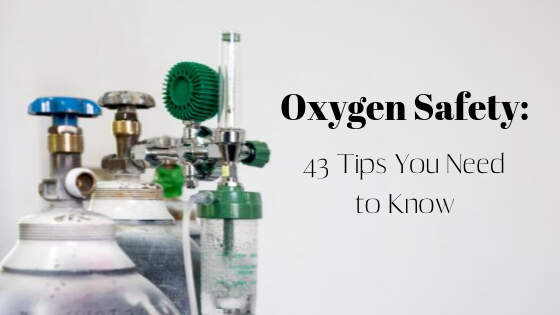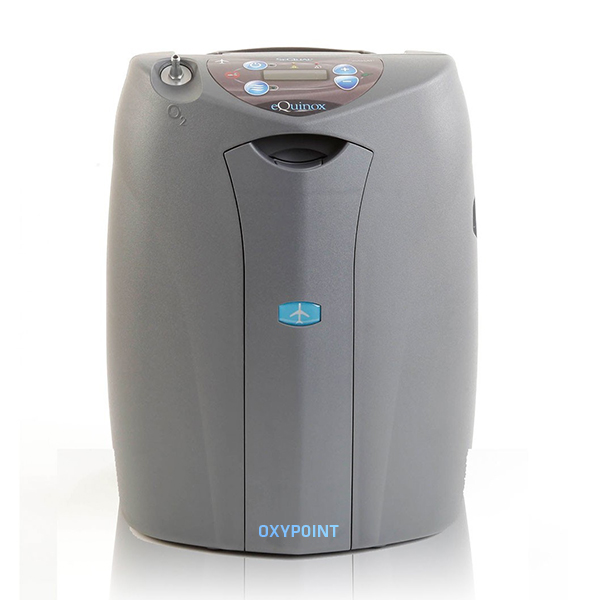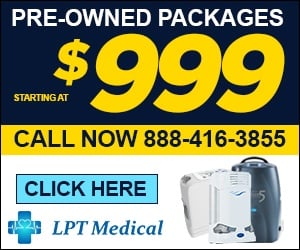Everyone experiences bloating every now and then, often the result of a big meal or a minor stomach illness. However, bloating tends to be a frequent problem for people with COPD for different reasons, and it's a problem that is frequently underestimated.

How to Treat Bloating Caused by COPD
Aug 21, 2018 11:00:42 AM / by Duke Reeves posted in COPD, Medication and Treatment, Respiratory Resource Center, Portable Oxygen, portable oxygen concentrator, oxygen therapy
25 Tips to Help You Breathe Easier in the Summer
Apr 10, 2018 9:15:10 AM / by Duke Reeves posted in COPD, Respiratory Resource Center, Portable Oxygen, Tips and Hacks, portable oxygen concentrator, oxygen therapy
Part of living with COPD is having to be extra careful about protecting your body, and especially your lungs, from harm. That means doing everything you can to avoid illnesses, exacerbations, and any environmental conditions that could weaken your lungs or make your symptoms worse.
Unfortunately, with every new season COPD patients have to adjust to new hazards and challenges that come with the change in weather. And with the summer on its way, it's important to know what to expect and how you can prepare yourself for the shift.
A Comprehensive Guide for Traveling with Oxygen and COPD
Mar 27, 2018 9:00:53 AM / by Duke Reeves posted in COPD, Respiratory Resource Center, Portable Oxygen, Tips and Hacks, oxygen therapy
The stress and hassle of traveling can be a challenge for anyone, but it poses a special challenge for those struggling with chronic diseases like COPD.
How to Make Supplemental Oxygen More Comfortable
Mar 21, 2018 4:37:09 PM / by Duke Reeves posted in Portable Oxygen, Tips and Hacks
Supplemental oxygen therapy is an amazing, enabling, and life-saving tool that many people with COPD use every day. However, while it can significantly improve how you feel and help you live a better quality of life, supplemental oxygen often comes with its own uncomfortable side-effects and inconveniences.
For example, most patients at some point have problems with ear pain from the ear loops of their nasal cannula. Many patients also struggle to manage their oxygen therapy when they're out of the house, struggling to tote around their equipment and worrying about running out of oxygen before they get home.
Some other common problems that oxygen patients have include dryness and inflammation, which often happens when the constant stream of air through your oxygen delivery device dries out your throat and nasal passages. Another uncomfortable side-effect is skin irritation, which is common on areas of the the face where equipment and tubing touches the skin.
16 Mucus Clearing Techniques That Alleviate Shortness of Breath
Feb 28, 2018 6:47:48 AM / by Duke Reeves posted in COPD, Medication and Treatment, Respiratory Resource Center, Portable Oxygen, Tips and Hacks, oxygen therapy
Many people with respiratory diseases COPD and Cystic Fibrosis have to deal with extra phlegm and congestion in their lungs and airways. It's an unfortunate symptom that can be difficult to manage, especially during periods of illness and exacerbations.
The Top 4 Continuous Flow Oxygen Concentrators
Feb 28, 2018 6:16:44 AM / by Duke Reeves posted in Medication and Treatment, Respiratory Resource Center, Portable Oxygen, portable oxygen concentrator, G5 oxygen concentrators, oxygen therapy
When you depend on supplemental oxygen to keep you well, a reliable portable oxygen concentrator is all but a necessity. Portable concentrators are uniquely useful because they turn regular, ambient air into concentrated medical grade oxygen for you to breathe.
That means there are no heavy, flammable tanks that need to be refilled or replaced. You'll have an unending supply of oxygen as long as long as you have battery power.
Portable concentrators can be life changing; they allow you to leave home, stay active, and go about all your daily tasks with convenience and ease. Many models even offer optional backup batteries so you can go out with confidence and use your portable concentrator even longer without interruption.
Because your health and comfort depends on it, choosing a portable continuous flow oxygen concentrator that fits your needs and lifestyle is an important decision. That's why, in this article, we've provided you with information about the top four continuous flow portable oxygen concentrators on the market.
We've included everything you need to know about their unique features, oxygen output, battery life, and more to help you make the best decision possible. Listed in no particular order, here are the top 4 portable continuous flow oxygen concentrators.
The Top 4 Pulse Flow Portable Oxygen Concentrators
Feb 28, 2018 6:11:50 AM / by Duke Reeves posted in COPD, Respiratory Resource Center, Portable Oxygen, portable oxygen concentrator, G5 oxygen concentrators, oxygen therapy

Pulse flow portable oxygen concentrators are different from continuous-flow concentrators in that they detect when you inhale and deliver a bolus dose of oxygen on-demand. Concentrators with pulse-flow technology are intuitive and responsive by automatically adjusting the amount of oxygen they deliver based on your breathing rate.
High Altitudes and Respiratory Diseases: What to Expect and How to Cope
Feb 28, 2018 6:02:06 AM / by Duke Reeves posted in COPD, Medication and Treatment, Portable Oxygen, Tips and Hacks
Living with a respiratory disease can make normal activities and hobbies difficult. Traveling, however, can be particularly challenging to do when you suffer from a chronic respiratory condition.
Oxygen Safety: 43 Tips You Need to Know
Feb 27, 2018 12:58:01 PM / by Duke Reeves posted in COPD, Medication and Treatment, Portable Oxygen, Tips and Hacks, portable oxygen concentrator, oxygen therapy
Lung function decline is a defining characteristic of COPD, and it gets worse as the disease progresses. Because of this, most COPD patients eventually have to begin using supplemental oxygen to help their lungs once they become too weak to absorb enough oxygen on their own.
The purpose of supplemental oxygen is to deliver extremely oxygen-rich air to your lungs, usually using a pressurized oxygen tank or an oxygen concentrator. This air, generally about 85-95 percent pure oxygen, allows your lungs absorb more oxygen with every breath.
Supplemental oxygen is a very important part of COPD treatment because it helps your lungs take in enough oxygen to supply your organs and tissues with the oxygen they need. Without it, your blood oxygen saturation can fall to unhealthy levels—a condition called hypoxemia—which can lead to serious, life-threatening complications over time.
How to Know What Oxygen Delivery System is Best for You
Feb 27, 2018 12:52:24 PM / by Duke Reeves posted in Medication and Treatment, Respiratory Resource Center, Portable Oxygen, oxygen therapy
For many patients who have COPD, oxygen therapy is a major feature of day-to-day life. If you use oxygen during the daytime, managing oxygen tanks and equipment inevitably becomes a routine part of almost every daily task and activity.


.png)










